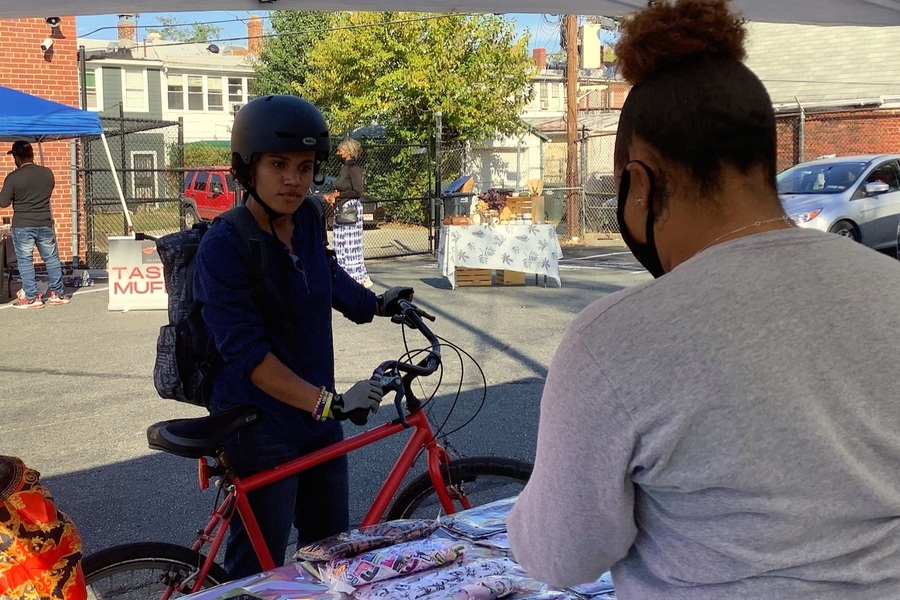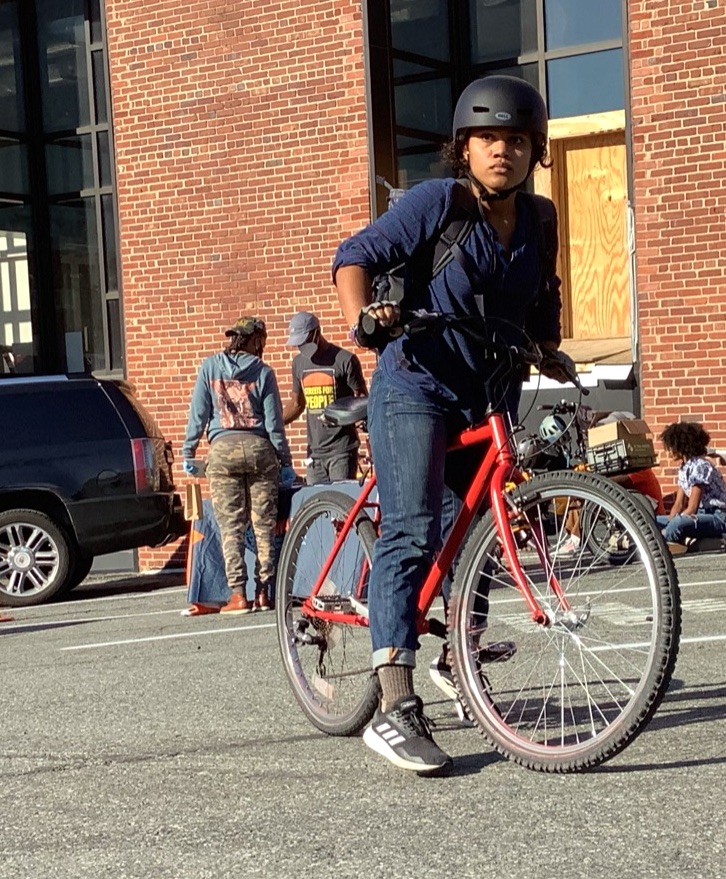COVID inspired or forced life changes in many people. Whether you left a job, developed a new hobby, or just changed your outlook, most of us are not in the same place we were 18 months ago.
For Pete Danelski, the unexpected closure of theatres prompted him to do some deep thinking about the state of the theatre industry.
“I thought, the worst thing we could all do now is run back into a theatre and turn the lights off and close the doors,” Danelski said of the early days of the pandemic, observing that while many of his friends and colleagues lost jobs in the arts during the crisis, society at large didn’t miss their presence.
So the Washington, D.C.-based theatre artist founded his own production company, Pan Underground, with the goal of making theatre more accessible to people across all segments of society—especially those who don’t typically attend theatre at all. Danelski’s first project with Pan Underground is therefore taking theatre to the streets. Literally. On two separate dates this fall, Danelski is staging Obie-winning playwright Caridad Svich’s Red Bike at outdoor locations in the D.C. metro area; the first was in Anacostia on Oct. 24, and the second in Walter Reed on Nov. 6. But this is no ordinary play. Instead Red Bike will be staged as part of a block party, with the play emerging organically out of the larger experience.
“It has taken on a life much like an art installation,” Danelski explained. “Yes, there is certainly a performance there, but is this a production where everyone is going to sit down and focus in one direction for an hour? No.”
Instead, Danelski said he has envisioned a scenario in which people—ticket holders and those who wander in by chance—experience theatre as something that happens within their community, a part of the fabric of their daily lives. No closed doors. No dark rooms.
For the first showing of Red Bike last weekend, I arrived in Anacostia, a historically African American neighborhood, and walked down streets dotted with colorful murals depicting abolitionist Frederick Douglass, Supreme Court Justice Ruth Bader Ginsburg, and former D.C. Mayor Marion Barry. The Red Bike installation was set up in a vacant parking lot around the corner from Busboys and Poets, a popular local coffee and book shop.
After showing my vaccination card, I entered the space and chatted with the few people I knew and several I had never met. Vendors were on hand selling jewelry, skin-care products, and my favorite: sweet and savory muffins that tasted like chicken and waffles in the same bite. A large speaker played D.C.-inspired songs from a playlist curated for the event by the production company 44:21. Two different bike organizations were there to hand out maps of bike trails and offer bike safety tips.
An hour into the event, a young person steered a red bike through the crowd. The play had begun.

Red Bike is a play about an 11-year-old child who takes a bike ride that inspires a fresh awareness of the neighborhood they live in and their place within it. It is set in a modern-day, unnamed American town in economic decline. Staging the play in the midst of a community that is itself going through economic shifts gives the whole event a very meta quality.
Danelski read the play on the New Play Exchange in the spring of 2020. “I couldn’t put it down,” he remembers. “I thought it was thrilling. It read less like a play and more like poetry.” He tweeted about his enjoyment of Svich’s play, and to his surprise, the playwright responded and noted that it had never been done in the D.C. area. Said Danelski, “After we went back and forth several times, I told her, ‘I think I want to change that.’”
Svich (she/they) welcomed the overture. They recalled, “Pete called me with this idea and I was like, ‘This is genius!’ I’ve been waiting for this to happen.” Red Bike has been performed about two dozen times since it received a National New Play Network Rolling World Premiere in 2019. Several Zoom productions were produced during COVID. But not only had it never been done in D.C.; it had never been done outdoors.
Though it wasn’t written to be staged experientially, for Svich, the notion of performing the play outdoors as part of a public gathering “speaks to the intentions of the play.” As the child character explores their town, they experience a dawning awareness of issues gripping contemporary American society, from global warming to financial inequality to post-industrial economic decline. “I was thinking about the current political landscape and that there are so many laws being enacted that will affect children as adults,” said Svich. “I wanted to put someone at the center of the story who logistically and legally can’t fight for any of that but is the most vulnerable and at risk.”
Creating a play with a child as a narrator was a departure for Svich, and one they embraced as a means of articulating the moment in life when an individual reaches the crossroads between innocence and awareness. “There is this awakening that happens around age 11 or 12, when children are working on identity and where they are positioned in the world,” they say.
With Red Bike, Svich also challenged themself to play with the idea of remaining in an environment that doesn’t provide economic security. “I’ve written a lot of stories about people running away from these kinds of towns, but I realized I hadn’t written about people who stay and fight for the place they are in,” they say. “I got obsessed with the notion of, how do you fight for the town that is dying? How do you find dreams in a world where those dreams may not be attainable but you are asked to dream them anyway?”
It was the play’s focus on community, and its use of poetic language, that attracted Danelski to Red Bike. In an effort to engage people not accustomed to sitting through a play, the production has been designed so that people need not necessarily watch it from beginning to end to appreciate it.
“Some people are going to wade in and out, some people are only going to experience part of it, and that is why Caridad’s writing is so perfect for this, because it is poetry,” Danelski said. “You can wade in and out of your own thought and memory just like the play itself does.”

Svich wrote Red Bike as a single monologue detailing the thoughts in the child’s mind as they explore their community. In past productions, they have worked with companies to divide the monologue among several actors (anywhere from two, as it is scored in the official TRW Plays script, to eight in college productions looking to make space for multiple actors).

In Pan Underground’s version of the play, a singular performer, Miranda Pepin (they/them), appears before the audience. Pepin is the focal point for the production but remains silent while performing a movement piece on and around the bike. The story reaches the audience through recorded dialogue, divided between three voices. “I loved the idea of a single body in the space,” Danelski said. “But I also wanted to blow identity apart and see how we can get multiple perspectives out of one person.”
That came through the audio. Audio director Aria Velz (she/her) was tasked with creating the sound of the production. “The beauty of Red Bike is that it’s not plot-heavy,” Velz said. “It’s a lot about mood and capturing emotion and memory. No matter what point you drop in, there will be something happening that can jog your memory of your own town or childhood.”
Velz worked with three performers (Alina Collins Maldonado, Ahmad Kamal, Bianca Lipford) to create three separate recordings of the script. She then combined the recordings, incorporating sound and music elements. The final recording bounces between the three distinct voices so that each actor voices specific portions of the text. Velz said that she leaned into the “instinctual differences that each actor brought to the text” to create the sensation of multiple perspectives running through the child’s mind.
Danelski’s theatre résumé includes working as assistant director to Aaron Posner on productions at several D.C.-area theatres, but it is his job as artistic programs director at CulturalDC that gave him the background and connections to mount the Red Bike street party. CulturalDC is an organization whose mission is to find spaces for visual and performing artists to “engage with audiences in new and exciting ways.” In developing projects that work across a variety of sectors, including real estate and marketing, Danelski developed contacts beyond the traditional theatre community.
Another asset, Danelski added: “I’m stubborn.” Through a combination of old contacts and cold calls to potential new partners, Danelski put together a collective of community partners that allowed him to keep the overhead on the project low, connect community members whose paths hadn’t previously crossed, and provide paid work for theatre professionals.
Gearin’ Up Bicycles, a nonprofit that teaches bike repair and customer service skills to teens, was the first group to come on board. Gearin’ Up donated the eponymous red bike used in the production and connected Pan Underground to 18-year-old Brinden Banks (he/him), who assisted the project as a bike safety coordinator. Banks, serendipitously, is an aspiring actor who happened to gain his first theatrical experience with Red Bike.
“My job was to make sure the bike didn’t break down during the performance, but it was also a great opportunity to see what the process of theatre was like,” Banks said of his experience. “I think this event has the power to bring people together and to bring attention to certain small businesses in the area. It could really do some good.”
At last week’s block party in Anacostia, things got quiet once the actor rode in on their bike. But it took a few minutes for spectators to realize what was going on when the speaker shifted from music to the Red Bike dialogue. Gradually, the audience formed into two groups: some who nestled into chairs ready to focus on the production, and others who continued shopping and chatting with vendors, occasionally tuning into a line or two of the play’s dialogue. That is exactly what Danelski and Svich hoped would happen.
“I feel really grateful,” Danelski told me a few days after the event. “One attendee, not a regular theatregoer, asked me if I could help them get the script. Speaking about one part of the play specifically, they said, ‘I didn’t think anyone else felt that way.’ I got to know them, laugh with them, and meet their kid. That’s what it’s about. It’s a few hours to be together and celebrate sharing something with each other.”
Nicole Hertvik (she/her) is the editor and publisher of DC Metro Theater Arts and an arts journalist covering the Washington, D.C., metro area.
Creative credit for production photos: Red Bike, by Caridad Svich, audio director Aria Velz, installation director Pete Danelski, associate producer Jordan Clark Halsey, and bike coordinator Brinden Banks.


